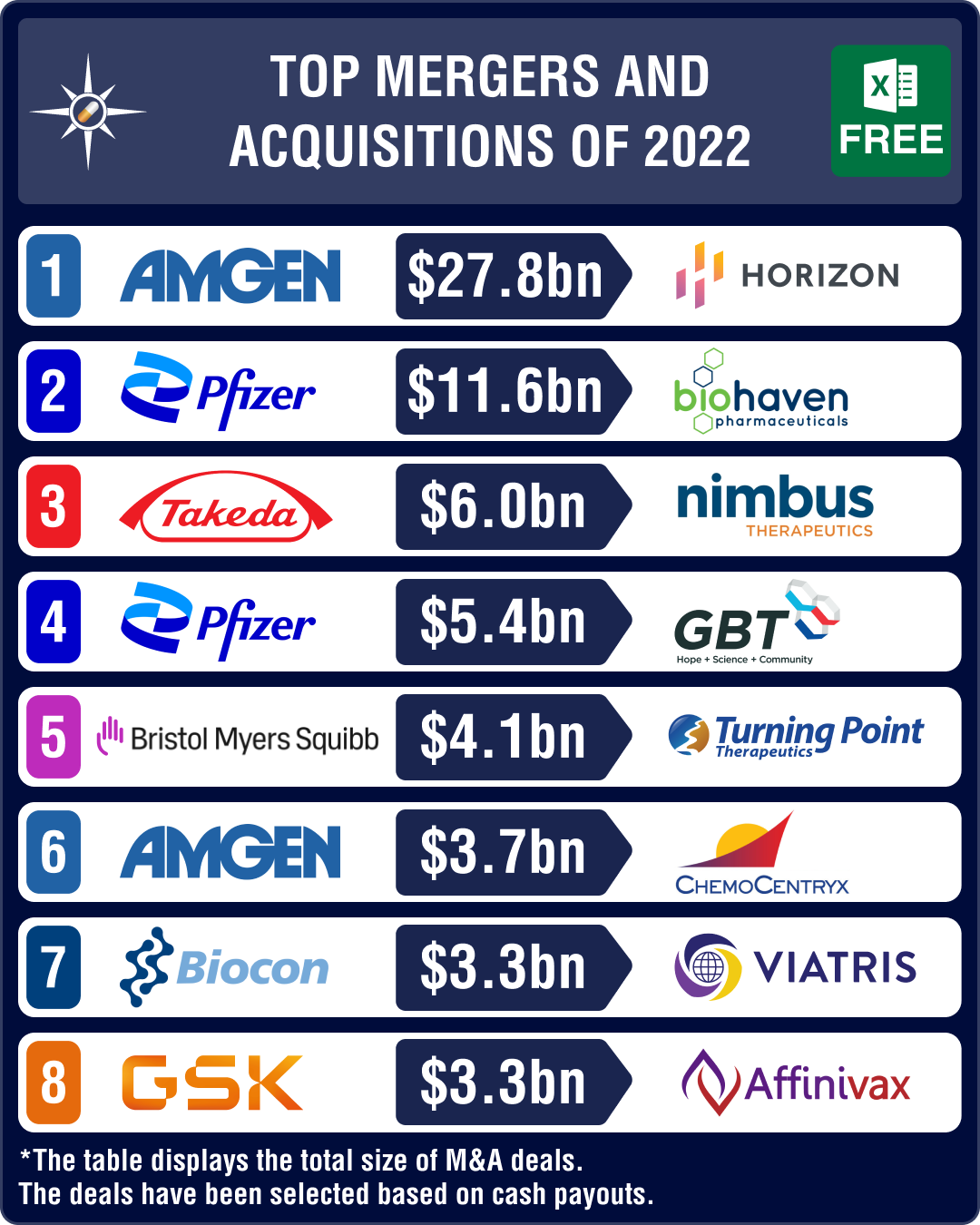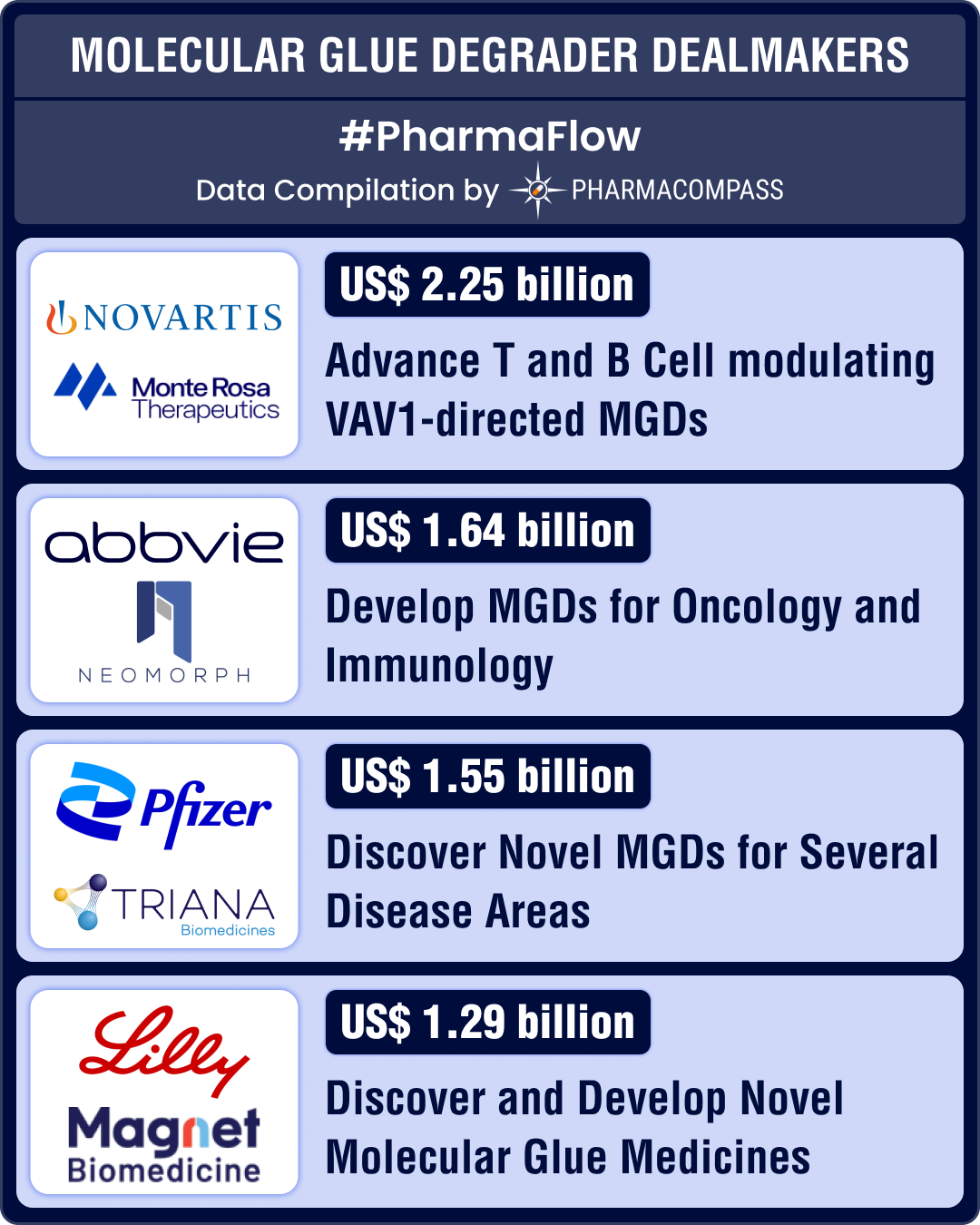
By PharmaCompass
2023-02-23
Impressions: 4652
The pandemic years haven’t been great for dealmaking. Our analysis of top 10 biopharma M&A transactions shows that after a blockbuster 2019, when the combined value of top 10 biopharma M&A transactions had hit US$ 207 billion, M&A activity decreased in the next two pandemic years, with the combined value of top 10 deals dropping to US$ 97 billion in 2020 and to US$ 53 billion in 2021.
In 2022, the combined value of the top 10 M&A transactions reached US$ 69 billion. However, our analysis shows that total M&As increased only marginally — from US$ 93.6 billion in 2021 to US$ 98.7 billion in 2022. In fact, the total M&As by upfront cash dropped from US$ 77.6 billion to US$ 76.3 billion. Our data does not include deals in medical devices, diagnostics and animal health.
Industry watchers had predicted 2022 to be the year of M&As, as Big Pharma were expected to spend the booty amassed during the pandemic on acquisitions. But record inflation, a looming recession, the ongoing Russia-Ukraine war, volatile stock markets and some regulatory moves (such as the US Inflation Reduction Act) deterred companies from loosening their purse strings.
The result was another lackluster year for M&As. The top 10 M&A deals in 2022, selected based on upfront cash paid, include Amgen’s Horizon takeover (US$ 27.8 billion), Pfizer’s purchase of Biohaven (US$ 11.6 billion) and Global Blood Therapeutics (US$ 5.4 billion), and BMS’ purchase of Turning Point Therapeutics (US$ 4.1 billion).
View Top 100 Pharma & Biotech Deals in 2022 by Deal Size (Free Excel Available)
Amgen buys Horizon in 2022’s biggest deal; picks up ChemoCentryx for US$ 3.7 bn
The year began on a sluggish note with M&A activity picking up in the second half. The biggest deal of the year — Amgen’s acquisition of Horizon Therapeutics — came in December.
Last November, Horizon Therapeutics had said it had drawn buyout interest from players like Amgen, Sanofi and Johnson & Johnson. Just weeks before Christmas, Amgen announced its US$ 27.8 billion takeover of Horizon. The Irish firm develops medicines for rare autoimmune and severe inflammatory diseases mostly sold in the US. Once complete, the deal will give Amgen access to Horizon’s two best-selling drugs – thyroid eye disease drug Tepezza and gout treatment Krystexxa.
Owing to the Amgen-Horizon deal, the rare diseases therapeutic area attracted the highest amount of M&As (by deal size). The second largest was neurology, with Pfizer taking over Biohaven and UCB Pharma acquiring Zogenix.
In August, Amgen had picked up Californian biotech ChemoCentryx for US$ 3.7 billion to help broaden its portfolio of inflammation and kidney drugs. The deal brought ChemoCentryx’s potential blockbuster treatment for inflammatory disorders — Tavneos (avacopan) — into Amgen’s fold, along with three early-stage drug candidates that target ulcerative colitis, skin conditions and cancer.
View Top 100 Pharma & Biotech Deals in 2022 by Deal Size (Free Excel Available)
Pfizer acquires Biohaven for US$ 11.6 bn, Global Blood Therapeutics for US$ 5.4 bn
The pandemic brought huge revenue gains for Pfizer and the drug behemoth decided to use the cash by cherry-picking companies that would strengthen its portfolio. In May, Pfizer notched up New Haven-based Biohaven Pharmaceuticals for US$ 11.6 billion. The deal gave Pfizer the rights to Nurtec ODT, a leading oral migraine drug in the US and a potential blockbuster. Biohaven has six other migraine drugs in development and Pfizer expects them to top US$ 6 billion in annual sales. Biohaven is Pfizer’s largest purchase since 2016, when it bought Medivation for US$ 14 billion.
Later in the year, Pfizer acquired blood disorder drugmaker Global Blood Therapeutics (GBT) for US$ 5.4 billion with the intention of expanding its sickle cell disease portfolio. Through this buyout, Pfizer has added GBT’s approved drug, Oxbryta, along with two other sickle cell medicines – GBT601 and inclacumab (both in mid- to late-stage testing) – into its portfolio. Pfizer expects all these blood disorder drugs to contribute US$ 3 billion in peak sales.
View Top 100 Pharma & Biotech Deals in 2022 by Deal Size (Free Excel Available)
BMS buys Turning Point for its oncology pipeline; Takeda acquires Nimbus Lakshmi
In June, Bristol Myers Squibb acquired California-based drug developer Turning Point Therapeutics for an upfront cash amount of US$ 4.1 billion to bolster its cancer drug pipeline. The deal gives BMS access to Turning Point’s star candidate, repotrectinib, in trials to treat non-small cell lung cancer (NSCLC) along with other advanced solid tumors. BMS expects repotrectinib to be approved in the US in the second half of 2023 and become a standard-of-care therapy for certain patients with NSCLC.
In December, Takeda Pharmaceutical acquired US-based Nimbus Lakshmi, a subsidiary of Nimbus Therapeutics that works on TYK2 programs, for US$ 4 billion in upfront payment. Through the deal, Takeda won Nimbus’ experimental psoriasis drug TAK-279. Takeda will make two milestone payments of US$ 1 billion each to Nimbus if TAK-279 achieves annual net sales of US$ 4 billion and US$ 5 billion.
View Top 100 Pharma & Biotech Deals in 2022 by Deal Size (Free Excel Available)
GSK enters pneumococcal vaccine race with Affinivax deal; UCB buys Zogenix
GSK – one of the world’s largest vaccine makers by sales – is set to compete for a share of the lucrative pneumococcal vaccine market with its purchase of Affinivax for a potential US$ 3.3 billion. Through the deal, the British drugmaker has gained access to the Boston-based biopharma’s 24-valent pneumococcal vaccine candidate, along with its vaccine development technology platform MAPS (Multiple Antigen Presenting System) and other assets. GSK believes the vaccine candidate will help it challenge market leader Pfizer’s blockbuster Prevnar range of vaccines.
GSK also paid US$ 1.9 billion for American drug developer Sierra Oncology and gained access to the latter’s targeted therapies for the treatment of rare forms of cancer. Sierra’s lead candidate momelotinib is being developed to address the unmet medical needs of anemic myelofibrosis patients. GSK believes the drug will work better at treating anemia than the currently approved JAK inhibitors on the market. FDA will decide on the drug’s approval by June 2023.
Belgian biopharma UCB paid US$ 1.9 billion for Zogenix, expanding its portfolio of treatments for specific and rare forms of epilepsy drugs. The acquisition will help UCB deepen its foothold in the epilepsy market, adding to its existing line of four products, including Vimpat and Briviact.
View Top 100 Pharma & Biotech Deals in 2022 by Deal Size (Free Excel Available)
Merck inks deal with Kelun Biotech; Regeneron buys rights to Sanofi’s cancer drug
Several drugmakers announced collaborations where milestone payments took precedence over upfront payments. In one such deal, Merck entered into a potential US$ 9.3 billion licensing and collaboration agreement with China’s Kelun Biotech that will give it rights to seven early-stage antibody-drug conjugate candidates against oncology targets. Merck paid a relatively small sum of US$ 175 million upfront to Kelun as part of the deal.
After partnering with Sanofi for seven years, Regeneron Pharmaceuticals acquired the global rights to cancer drug Libtayo from the French drugmaker for an upfront payment of US$ 900 million. Regeneron paid another US$ 100 million to Sanofi after FDA approved the drug as a first-line treatment for adult patients with advanced NSCLC (to be administered in combination with platinum-based chemotherapy). As part of the deal, Sanofi will receive a royalty of 11 percent on worldwide net sales of Libtayo and will get another potential US$ 100 million in sales-related milestone payments over the next two years.
View Top 100 Pharma & Biotech Deals in 2022 by Deal Size (Free Excel Available)
Biocon acquires Viatris’ biosim business; Biogen sells stake in Samsung Bioepis
Biocon Biologics, a subsidiary of Indian drugmaker Biocon, acquired US-based Viatris’ biosimilars business for US$ 3.34 billion. The deal expanded Biocon’s biosimilar portfolio of 20 treatments – including 11 that were with Viatris – by adding therapies for treating diabetes, tumors and autoimmune diseases. According to Biocon, Viatris’ biosimilar portfolio is expected to generate over US$ 1 billion in 2023.Samsung Biologics shelled out US$ 2.3 billion to take over partner Biogen’s stake in Samsung Bioepis, which the duo had set up in 2012 to develop and manufacture biosimilars. Biogen, however, retained the commercial rights to both Byooviz (a biosimilar of Novartis’ eye drug Lucentis) and the investigational candidate SB15 (a biosimilar of Regeneron’s Eylea) along with the biosimilars of Enbrel, Humira and Remicade.
View Top 100 Pharma & Biotech Deals in 2022 by Deal Size (Free Excel Available)
Our view
Globally, M&As slowed down substantially across all industries in 2022 as companies confronted challenges such as rising interest rates, a pullback in leveraged finance, bond-market jitters and the possibility of a recession. According to Refinitiv, the total value of deals announced globally fell 37 percent last year — the biggest year-over-year percentage drop since 2001.
Going by these statistics, the pharmaceutical industry didn’t fare badly. In its latest ‘Pharmaceutical & life sciences: US Deals 2023 outlook’ report, PricewaterhouseCoopers has predicted a more active 2023, with “M&As to more closely resemble prior years” with a total deal value in the US$ 225 billion to US$ 275 billion range across all sub-sectors.
The new year has begun on a positive note, with three M&A deals worth over US$ 4 billion being announced at last month’s JP Morgan Healthcare Conference. A series of patent expirations are going to put global prescription sales at risk through 2026. Therefore, it seems plausible that the recent momentum in M&A activities will continue throughout 2023.
The PharmaCompass Newsletter – Sign Up, Stay Ahead
Feedback, help us to improve. Click here
Image Credit : TOP MERGERS AND ACQUISITIONS OF 2022 by PharmaCompass license under CC BY 2.0
“ The article is based on the information available in public and which the author believes to be true. The author is not disseminating any information, which the author believes or knows, is confidential or in conflict with the privacy of any person. The views expressed or information supplied through this article is mere opinion and observation of the author. The author does not intend to defame, insult or, cause loss or damage to anyone, in any manner, through this article.”








